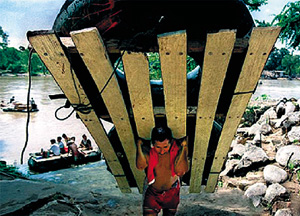 |
 |
 |
 News from Around the Americas | December 2006 News from Around the Americas | December 2006  
Peak Season Under Way for Homeward Central Americans
 Lynn Brezosky - Associated Press Lynn Brezosky - Associated Press


| | Some migrants cross the Suchiate River on the Guatemala-Mexico border on crude rafts like this one being hauled out on the Mexican side. Here in the state of Chiapas, undocumented Cental American migrants are hunted by authorities and gangsters with equal ferocity. (LATimes) |
Los Indios — Not much happens at the Free Trade Bridge here, one of the most remote and least-used international crossings on the Southwest border.

Not much until the holidays, that is, when Central American immigrants from around the nation pull in with chains of secondhand cars and other goods bound for resale during holiday trips home.

For four years, this bridge has been the only one to accept the "transmigrantes," so-named for the visa Mexican officials give them to beeline some 1,500 miles through Mexico. For the caravans arriving from as far away as Washington state, California, and New York, Texas' southernmost county has a new amenity: a 3-acre lot that allows for quick bonding over soccer games and tamales from strolling vendors.

"I'm lucky. I only come from Houston," Javier Pacheco, a 42-year-old Honduran, said Tuesday. "But a lot of people come from Washington, Tennessee, Utah, New Mexico. They have been driving more through the USA. than they'll drive to their places."

The holidays are "the hottest time," Pacheco said. "Everybody wants to get there before Christmas."

In previous years, the wait for U.S. and then Mexican processing had cars backed up more than a mile along Route 509, a two-lane highway cutting through 10 miles of farmland to one of the border's least used bridges.

Transmigrantes would sometimes be seen stretched out napping beside their string of cars.

"It's been something that created some logistical problems," said Pete Sepulveda, Cameron County transportation director. "We had this land and decided to use it."

The transmigrantes give the lot a thumbs-up.

"It's a very good experience, I think," said Rene Carrillo, a Los Angeles resident on his way to his home in Guatemala for the first time in 20 years. He said he had already traveled with his wife and two children for 44 hours. "You meet many people. You're eating taquitos and things. You talk to everybody."

The transmigrante phenomenon has been growing over the past decade.

Goods that might be considered throwaways in the United States can be hard to come by in impoverished parts of Latin America. For some, gathering stuff here and reselling there is a livelihood. But most are making an extra buck during an annual trip home.

The Mexican government now prohibits the old bicycles, clothes, toys and electronics that used to be seen piled high in old buses and jalopies making the trip. Goods seen Tuesday included an old lawn mower, an exercise machine, stacks of restaurant chairs and a baby walker. But the buses and jalopies are still allowed, and they are by far the transmigrantes' most profitable and popular export.

Pacheco and Carrillo each had several old cars chained behind the one they were driving, and both said they expected them to quickly sell. Both had legal U.S. residency and planned to come back to their jobs in January and February.

In 2002, U.S. and Mexican officials agreed to make the Free Trade Bridge the only bridge for transmigrante travel. Mexican officials said they wanted to specialize the bridges, and the Free Trade Bridge had both sufficient Customs personnel and access to the most direct routes through Mexico. While many transmigrantes were caught unaware that first year and protested, word has since spread.

The transmigrantes now say Mexico seems to have cracked down on highway police corruption, so the journey through Mexico is no longer a harrowing trek of bribes and robberies.

"In the past, it was hard for us to get through," Pacheco said. "But now, we just pay $200 to cross, once at the beginning. It's official, it's not like underneath the water." | 
 | |
 |



